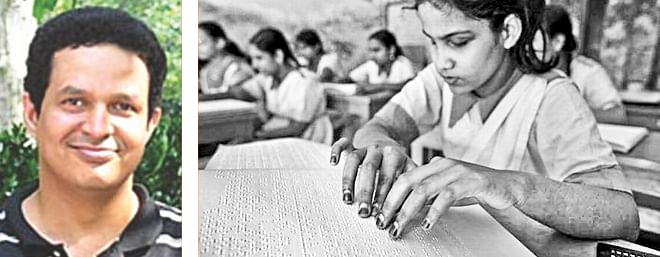Light for the blind
Light for the blind
One man's initiative prompts thousands to join hands, prepare Bangla Braille books

It was a fine morning of June 25, 2013. Ragib Hasan reached his office at the University of Alabama in Birmingham, USA and started off the day by checking online news portals. Suddenly, one report caught his eyes.
The story portrayed plights of the visually-impaired school children in Bangladesh. Even six months into the academic year, they did not get their textbooks due to lack of Braille printing facilities in the country. To add to their woes, no digital copies of the books were available either.
An assistant professor of Computer and Information Sciences of the university, Hasan was especially touched by what a child said: "... all my friends got books on the first day of school, but I and other visually impaired children didn't get any even after six months.”
He was moved ... but only for a while. He started thinking of doing something for the specially-able, he told The Daily Star in an online interview.
He came up with a plan of finding volunteers to type the books into digital Unicode form and create audio-books. On a test basis, he recorded a chapter from a book using his iPhone which took only five minutes.
“I was amazed to see how the little effort worked and how easy it was to create the audio version of the book. The visually impaired children could listen to the books on mobile phones or cheap mp3 players,” said Ragib Hasan, a BUET graduate, who did his PhD in Computer Science at the University of Illinois at Urbana-Champaign.
Around noon on that very day, he started a Facebook group named BanglaBraille [http://www.facebook.com/groups/banglabraille] and started inviting people to the group. He requested everyone to start typing the books or upload the image versions of whatever books were available in the website of the National Curriculum and Textbook Board.
The response was astounding.
Volunteers started pouring in droves immediately. As Ragib was flying out to Washington DC that very afternoon, he kept approving people into the closed group.
“By the time I checked into the hotel, more than 500 volunteers signed up. And within a few days, we reached more than a thousand, then 2,000. As of now, we have 2,850 volunteers in the Facebook group,” he said.
Engineers, doctors, teachers, students, corporate employees-- all sorts of professionals, mostly youths, joined the group from home and abroad and put their hands together in the noble venture.
Volunteers start a thread on a particular textbook in the Facebook page, and then they divide the pages among themselves. Then each volunteer starts recording the book page by page and share the audio files using Dropbox, a popular file sharing service, with the project co-ordinators.
Eventually, the audio and digitised books are assigned to reviewers, who go through the contents and release the books through their website -- http://www.banglabraille.org .
So far, 24 audio and 24 digitized books of class I to class IX-X have been released on the site. Anyone can download those free of cost and can get the digitised ones printed in Braille.
Ragib said they had a large number of books, which were awaiting editing, would be made available in phases. Once done with all the books in the school curriculum, the BanglaBraille plans to start creating audio versions of the books for colleges and universities. And then they would set their eyes on the classic literature books.
“We are also planning to load audio books in inexpensive mp3 players and then distribute those among the visually impaired children for free,” said the researcher of computer security and cloud computing.
Salwa Mostafa, an engineer at Intel Corporation in California, is one of the volunteers who joined the Facebook group immediately after Ragib's call and offered to generate audio books and coordinate other volunteers.
“Working in this project makes me feel hopeful that together when we care, we can make a change for the better,” she said.
Referring to World Health Organisation, Mosharef Hossain Bhuiyan, general secretary of Bangladesh Visually Impaired Peoples' Society, said there are only seven primary schools for the 50 lakh visually impaired people in Bangladesh.
Besides, only 10 visually impaired students in a district are given the opportunity to study with other students which often deprives many of the specially-able of attending schools.
Also, education materials for the visually impaired are very costly. For example, printing one Braille book costs around Tk 1,500, he said, adding that BanglaBraille could do a great job by reaching audio materials to those in need.
Rezaul Karim Siddique, who hosts the Mati O Manush show on the state-run Bangladesh Television, recorded audio books on agricultural education of class VI and VII for BanglaBraille.
“I am just simply amazed. The way the youths are volunteering is a lesson for those who do nothing without funds,” he told The Daily Star.
Ragib Hasan, who has been involved in the development of Bangla Wikipedia since 2006 and is the founder of the first and largest open online education platform in Bangla-- shikkhok.com, said he was surprised to see there were virtually no Bangla audio textbooks.
“We intend to fill that void and let the light of knowledge reach the visually impaired population of our country,” he said.